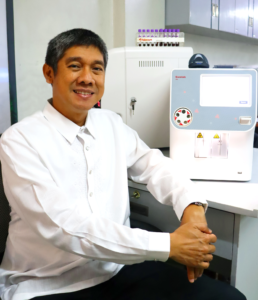Founded in October 1983, Biocare has continuously provided customers with the highest quality diagnostic equipment for the past 40 years. Biocare is Boule’s distributor of Swelab products in the Philippines and has more than 300 units installed in the country. Here, we ask the company’s CEO Alexander Crisostomo about his views on the market, the partnership with Boule and what the future holds.

Alexander Horacio V. Crisostomo, President, Biocare Health Resources, Inc
What general market and technology trends do you expect to see?
Artificial intelligence (AI) is on the rise. Advanced AI processes information much faster than humans can, increasing efficiency. It can even solve problems of misdiagnosis and medical errors to some extent. AI is already used in some hematology machines where high-tech sensors and algorithms can detect different cells. We also expect a greater amount of point-of- care analysis, with new parameters for hematology and where the results can be transmitted via a mobile or social media app so that doctors can make a diagnosis. Demand will increase significantly as more mobile clinics and stand-alone laboratories reach beyond the major cities to more remote areas and developing provinces.
How do you think the hematology market in the Philippines will develop?
We believe the hematology market in the Philippines will grow steadily as the country continues to prioritize the healthcare system through the Universal Health Care Act. Hematology market demand will continue to increase with demand for machine upgrades from manual blood cell counting to 3-part analyzers and from 3-part analyzers to 5-part analyzers. In terms of after-sales service and the program for preventive maintenance of instruments, we believe the trend of providing customers with high quality service will continue.
How would you describe the cooperation with Boule?
The cooperation between Biocare and Boule is based on a solid foundation. We have been working together for eight years and are constantly fulfilling our ambition to provide high-quality products and create value for patients and the healthcare industry. In the Philippine market, we have many challenges with other players, but thanks to the transparency and support offered by Boule, we are able to achieve our strategic goal. Our trust and confidence in Boule means we have strong mutual cooperation.
What do you view as the main advantages of Boule?
Boule’s strong brands and business model are beneficial to us. We are grateful for their robust and reliable Swelab technology. Because it is so easy to use, it makes our customers very happy. The ongoing training provided by the Boule Academy is effective in helping us distributors stay
updated and educated on new technologies and hematology issues. Boule’s technical service is also very efficient and reliable, which helps us maintain our strong position in the market. Overall, Boule has the ability to develop and manufacture high quality products that meet market
demand.
Anything else you want to mention?
The micropipette adapter (MPA) has been the highlight of our Swelab Alfa 3-part operations in the Philippines. Our customers really like this feature because they can’t get it in other hematology brands. In fact, we use these features as a lock-in effect in our government procurement
specifications. That’s why we’re so excited about Boule’s upcoming new 5-part hematology analyzer with MPA and autosampler. We look forward to the launch. The hematology market is constantly evolving, and strong players are focusing on innovation. We hope that Boule’s
research and development will be able to meet market demands. There is also a tendency to have a regional office in South East Asia for direct technical support and access to reagents. This can allow us to remove time zone barriers with less waiting time and provide better service to our customers in Asia.
Learn more about Swelab hematology analyzers.


